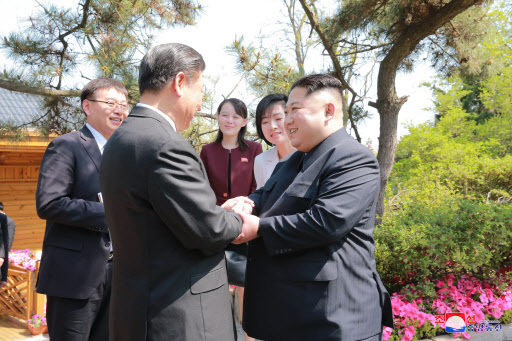North Korean leader Kim Jong-un’s visit to China for the second time in less than two months signals Pyongyang’s desire for Beijing’s involvement in the denuclearization process ahead of his summit with US President Donald Trump, experts say.
The Chinese Foreign Ministry confirmed Tuesday that Kim met Chinese President Xi Jinping on Monday and Tuesday in the northeastern Chinese city of Dailan, where he reiterated his commitment to the denuclearization of the Korean Peninsula.
The summit might have been in China’s interests, too, as the country seeks to regain its influence over denuclearization talks and over North Korea -- a key bargaining chip in Beijing’s deals with the US, according to analysts.
Kim’s meeting with Xi took place as North Korea and the US prepare for their high-stakes summit expected to take place by mid-June. Mike Pompeo, US secretary of state, traveled to North Korea on Wednesday to finalize a date and location for the talks.
During his meeting with Xi, Kim reportedly reiterated that he hoped “phased and synchronized” measures would be taken by South Korea and the US to realize denuclearization on the Korean Peninsula.
Pompeo, however, said en route to North Korea on Wednesday, that the US has no interest in following a step-by-step process, highlighting their differences over how to achieve the goal of “complete denuclearization” of the Korean Peninsula.
The meeting between Kim and Xi demonstrated that North Korea wants China to play a larger role in the denuclearization process to better serve its own interests, an expert said, as the US steps up pressure against North Korea ahead of the summit.
“I think Kim Jong-un went to China for multiple reasons. The visit is intended to seek sanctions relief from China, and China’s help ahead of the North Korea-US meeting (to make it successful) and in the aftermath of the meeting,” said Kim Hyun-wook, a professor at the National Korea Diplomatic Academy.
“After the summit, in the process of declaring an end to the Korean War and signing a peace treaty, North Korea needs China’s involvement to better reflect its interests. Without China, the talks cannot but be dominated by the US and South Korea,” he said.
Kim flew to Dalian on Monday on his private jet, according to North Korea’s state-run media. He held discussions with Chinese officials including Foreign Minister Wang Yi, attended a formal banquet and took a stroll on a beachfront sidewalk with Xi.
Accompanying Kim was his younger sister Kim Yo-jong, as well as officials in charge of North Korea’s foreign policy toward the US -- the ruling party’s vice party chairman on international affairs, Ri Su-yong, and Foreign Minister Ri Yong-ho.
Kim and Xi met in person for the first time during a secret meeting in Beijing in late March, after Trump accepted Pyongyang’s suggestion for a summit. The visit was widely viewed as a sign of warming ties between the two countries, which could increase the North’s leverage and ensure that China is still a major player in the fast-paced diplomacy over the North’s nuclear programs.
North Korea’s relations with China, which is a major source of hard currency, oil and economic aid, had been frayed as China backed the US-led international sanctions against the reclusive regime over its pursuit of nuclear and missile programs.
Now, North Korea seems to have new leverage after Kim’s summit with South Korean President Moon Jae-in on April 27. The two Koreas said they will inherit the previous inter-Korean agreement signed on Oct. 4, 2007, in which the two sides agreed to expand cross-border economic cooperation.
Moon has already asked administration officials to find ways to increase economic cooperation with North Korea without breaching multi-layered international sanctions.
For China, Xi might have wanted to show that the relationship with North Korea is now repaired and that its role is important in resolving North Korea’s nuclear standoff.
China has been seen as sidelined in the process of denuclearization in recent months amid North Korea’s rapprochement in North Korea’s relations with South Korea and the US.
In the April 27 declaration, the two Koreas agreed to hold three-way talks among the two Koreas and the US, or said they could involve China for four-way talks, to end the Korean War and sign a peace treaty. The US and China are both signatories to the armistice.
Kim’s visit to China should be seen in the broad picture of growing Sino-US rivalry, another North Korea expert pointed out, as the major powers’ roles in tackling the North Korea’s nuclear issue could affect their standing in the region.
“China is seeing North Korea as one of its bargaining chips amid ongoing competition with the US,” said Kim Dong-yub, a professor at Kyungnam University’s Far East Institute.
Despite their pledge to work together to lead North Korea to denuclearize, conflicts have intensified between the two countries over other issues such as China’s trade surplus with the US and the US’ stance on Taiwan.
“The US might not want China to be involved in the negotiations,” he said. “Whoever takes a lead -- whether it is the US or China -- in resolving the North Korea’s nuclear crisis and establishing a peace system would eventually be linked to the future of their relations.”
By Ock Hyun-ju (
laeticia.ock@heraldcorp.com)





![[Exclusive] Hyundai Mobis eyes closer ties with BYD](http://res.heraldm.com/phpwas/restmb_idxmake.php?idx=644&simg=/content/image/2024/11/25/20241125050044_0.jpg)
![[Herald Review] 'Gangnam B-Side' combines social realism with masterful suspense, performance](http://res.heraldm.com/phpwas/restmb_idxmake.php?idx=644&simg=/content/image/2024/11/25/20241125050072_0.jpg)

